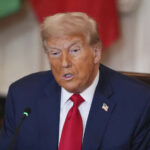This is an audio transcript of the Rachman Review podcast episode: ‘What will Donald Trump’s second term in office look like?’
Gideon Rachman
Hello and welcome to the Rachman Review. I’m Gideon Rachman, chief foreign affairs commentator of the Financial Times. This week’s podcast comes to you from Washington, DC. Donald Trump has won the US presidential election. With me to discuss the implications are Edward Luce, the FT’s US editor, and Susan Glasser of The New Yorker, co-author of The Divider, a book on Trump’s first term in office. So why did Trump win and what happens now?
Donald Trump voice clip
We’re gonna fix our borders. We’re gonna fix everything about our country. And we made history for a reason tonight. And the reason is going to be just that we overcame obstacles that nobody thought possible. And it is now clear that we’ve achieved the most incredible political thing. Look what happened. Is this crazy?
Gideon Rachman
That was Donald Trump giving his victory speech in Mar-a-Lago. It would be wrong to say that Trump’s victory was unexpected. A year ago, when Ed, Susan and I last recorded an episode of this podcast in November 2023, it was headlined “Trump closes in on a second term in office”. Even so, the scale of the victory was pretty stunning, with Trump winning every one of the seven swing states. So I began our conversation by asking Ed Luce if America now clearly wants what Trump is selling.
Edward Luce
Well, I mean, at least half of America does. And what does that mean? It means mass deportation. I’m not sure people in practice know what that would really mean, but certainly on paper it means mass deportation, border wall.
Gideon Rachman
Mass deportation of what, 11mn?
Edward Luce
Well, Trump mentioned numbers of up to 25mn. I mean, I don’t know where he gets those numbers from, but this would imply families, dreamers, people being swept up. I mean, the scale and detail of a bureaucracy that would get the right people and do this properly is unimaginable. So this will be brutal. I’m not sure Americans know what they’re really voting for, but on paper, that means deglobalisation. He was very explicit about the tariff plans. Tariff is the most beautiful word in the English language. The 60 per cent on China, 20 per cent on everybody, allies and adversaries alike. That’s very explicit. And I think, let’s be frank about it. Some of the more sort of fringy and progressive sort of identity politics were in people’s sights, too. This is a defeat for campus America. This is a defeat for cognitive elite America.
Gideon Rachman
You mean the stuff that’s generally referred to as woke, whether it’s on identity, (inaudible) transgender, all of that, which was central to Trump’s campaign.
Edward Luce
Which was central to Trump’s campaign. And just the sort of final point is whatever Trump’s character, whatever he is . . . well now, will be vanished away. But legal docket of all these cases against him, Trump’s character wasn’t sufficient for people to think that they didn’t want him back. I mean, none of this really matters. And I did write a column last week that America is not worried by fascism. It isn’t worried by that side of Trump, and some of it wants it.
Gideon Rachman
So, Susan, you have written a book on the first term in office. How much do you think that will be a guide to the second term in office?
Susan Glasser
Yeah, I think it’s an important prologue to what is coming, Gideon. And my concern and the concern of the sources that I interviewed for this book — we talked to more than 300 former Trump administration officials, all of them either Republicans appointed by Donald Trump himself or non-partisan national security types. And what we heard very powerfully from them is that a second-term Trump would be far more reckless, radical, unconstrained and very focused on transforming the apparatus of the US federal government, both into an instrument of his personal and political loyalty, and also to carry out an agenda in a way that the first-term Trump was simply unequipped to do. He didn’t have the right personnel, had no real experience.
The analogy that sticks to mind that unfortunately is quite relevant on this morning in Washington is from a conversation I had with a very senior US national security official who spent a lot of time personally in the Oval Office with Donald Trump in his first term. And this official said to me, what you need to understand, Susan, is that a second-term Donald Trump is like the velociraptors in the first Jurassic Park movie. And you remember the quite unforgettable scene where the children who were the stars of that movie, they are trying to escape the velociraptors and they run into the industrial kitchen and they slam the door and they hide and they think they’re safe. And then, click, you hear the door handle turn. Because the velociraptors have learned while hunting their prey, they’ve adapted and . . .
Edward Luce
They know how to open doors.
Susan Glasser
And by the way, to have this, I can’t say who this person is, but a very, very senior, non-partisan official in the US government who spent hours in the Oval Office with Donald Trump tell me this, I think it’s something we need to take very seriously now that this second term is here.
Gideon Rachman
Yeah. And in fact, I mean, I’m sure he was probably one of your sources. The person who used the word fascist about Trump during this campaign was not a campus radical. It was John Kelly, a former general, his former chief of staff. So if he doesn’t have the Kellys, those kinds of people, what kind of people, names or just their characteristics — I’m interested to get both your views on who we’re gonna see staff in the Trump administration.
Susan Glasser
Yeah. I mean, look, I am a believer that personnel, in particular with Donald Trump, is policy in Washington, in most capitals, you know. I’m mindful of the old Soviet phrase, you know, the cadres decide everything. And I think this is particularly true for Donald Trump because he is such a transactional figure. As we all know, he’s not exactly a policy wonk either. And so who he has around him really matters. I think that’s why many foreign leaders, including many of America’s adversaries, have concluded that Trump is highly manipulable. And that, I think, is the approach we’ll see many of them take. But that’s true of the staff as well.
Also, I recall an interview conversation with Jared Kushner, his son-in-law, who was a very senior official in the Trump White House. And he was very clear that their takeaway from Trump I was that we had not managed to get a staff of loyalists who would do what we want and that that would be paramount going to Trump II. One of their transition co-chairs is a New York Wall Street billionaire who gave an interview to your publication, the FT.
Gideon Rachman
Is this Howard Lutnick?
Susan Glasser
Howard Lutnick, in which he said that he is the one who has the specific portfolio of finding potential names for appointments in the Trump administration. And he said they will impose a loyalty test not just to the policies of the new Trump administration, but to the person. You know, once again saying the quiet part out loud: when these folks are telling us this, we need to take that very seriously.
Gideon Rachman
And Ed, I mean, how effective do you think this plan will be to purge the bureaucracy if such a plan is put into action? It was in Project 2025, the famous Heritage Foundation document, but they’ve kind of disavowed it. But it now appears that they will try something like this. How do you even go about doing that?
Edward Luce
Oh I think they will reavow it now that the election is over and take it as a mandate. And this is the only plan that is out there. And it’s a plan that comes with personnel. And Susan says personnel is policy. I expect a set of key people in his administration, people who will not try and block him or inhibit him or muffle his instincts because he had four years of that in his mind. Stephen Miller will be an absolutely key figure. I think Kash Patel will be a figure, possibly CIA director. I think that Ric Grenell, the former persona non grata Trump ambassador to Germany.
Gideon Rachman
You’re fanning yourself.
Susan Glasser
(Laughter) Was it the 19th century? I have the vapours.
Edward Luce
You’ve got the vapours.
Susan Glasser
Oh I wish.
Edward Luce
But we’re all swooning because of the heat. But the most important job — and JD Vance has said this — in a Trump administration the second-most important job, meaning before the one he’s going into, vice-president, will be the attorney-general.
Susan Glasser
By the way, it’s more important.
Edward Luce
Yeah, it’s more important.
Susan Glasser
Donald Trump isn’t gonna be sitting around listening to his vice-president.
Edward Luce
I think that’s absolutely right. And he means what he says. He has an enemies list. How extensive it is and how quickly he’ll go through it is another question.
Gideon Rachman
So you’re saying that there will be political trials? But I guess they will see this . . .
Edward Luce
Wait one second. Political trials, I mean, personal bankruptcies, fending off cases that probably have no chance of winning, but you’re bankrupt. Your legal fees destroy you.
Gideon Rachman
I guess you see they will say, won’t they, Susan, well you did this to us. Look at Giuliani. I mean, he was having to auction off his memorabilia and etc. So they see it as revenge?
Susan Glasser
Right. Well, I think Trump has explicitly articulated it as revenge. Again, you know, subtlety was not the hallmark of what was going on here in this campaign the last few years. Donald Trump has explicitly, in fact, used words like retribution when speaking about his goals for a next term. Again, take this seriously and literally. A great failure, we can talk and let’s not do it now because it’s too raw. But there’s, you know, many recriminations to go around. The failure to take Trump sufficiently seriously these last few years, we all, I think, can understand now was a terrible mistake on the part of his Democratic opponents.
But in terms of the attorney-general, I think that Ed is very right, that this is the agenda that will concern Donald Trump most directly. And it was a through line as we looked at the history of his four years in office. What people may have forgotten — and there was a lot of what I think is fair to call Trump amnesia that powered unfortunately his victory in 2024 — but what people should look at is how much Trump’s desire to weaponise and use the justice system was a through line from the very beginning of his presidency. It was a cause of friction with both of his attorneys-general, Jeff Sessions, whom he eventually fired, and Bill Barr, who I think is really an interesting example of a phenomena we’re likely to see. Bill Barr, an extreme rightwing conservative, had a real ideological agenda, you know, was a key part of wanting to transform and move America’s judicial system far, far to the right, came in to serve Trump willingly, broke with him as so many people have, including very ideologically conservative people.
You know, the testimony against Trump has always been coming from inside the room. Bill Barr was the one who stood out publicly in December of 2020 and said, Donald Trump is not telling the truth about the rigged election. There was no rigged election. There is nothing to prosecute. Trump was demanding that Barr open investigations and prosecute Joe Biden in the fall of 2020. Even before the election, Barr said no. So it seems to me that Trump’s paramount goal here is to put somebody in that position who will say yes and not no.
Gideon Rachman
And who do we think they’ll go after? I mean, maybe one shouldn’t speculate, but Mark Milley, the former head of the Joint Chiefs of Staff, is somebody that I think Trump has said should be put on trial for treason.
Edward Luce
He’s mentioned a lot of names.
Susan Glasser
That’s a different issue, you know, because the way it could work in America’s system — and this would be an act of extraordinary vengeance, unbelievably divisive and controversial — but in our military system, I don’t know how it works. In the UK, you can recall to active duty even very senior military officials. So Mark Milley is now a retired four-star army general. The commander-in-chief could cause him to be recalled to active duty and then face court martial. So in the case of the generals who turned on Trump, that would be the extraordinary sanction that he would be looking to pursue. I don’t know if he would do that.
Then there’s the question of the actual, you know, using the civilian court system, the justice department, the FBI, to go after his political enemies, which, again, he has said out loud repeatedly in just the last few weeks that he believes that he should go after the, quote, enemies within, the political enemies within this country.
Edward Luce
He’s also said he shouldn’t have left office in 2020. So, I mean, to him, this is a referendum on 2020. He won the referendum. It was a stolen election. He now has a mandate to hold to account those who stole the presidency from him. And, you know, the Orbán, Viktor Orbán book or the Narendra Modi book is not necessarily to put these people in jail. It’s to bankrupt them in legal fees. If just a nuisance like FBI investigations, DoJ investigations, all kinds of subpoenas, inquiries, tax audits from the IRS, you bury them, you turn their lives into a living hell. And the chilling effect on all other forms of dissent out there, knowing this can be done at a whim, even if ultimately you will be exonerated by a court and it will all prove to be you were innocent all along, you’re a victim. It doesn’t matter what happens in 2028, you are terrified now of being ruined. And he can ruin and he will ruin. He is a vengeful character.
Gideon Rachman
I mean, I’m struck, Susan — you know I’ve just been here for this week in the run-up to the election — by how much talk there is, you know, in embassies and parties about people leaving the country, getting out ahead of time. Have you heard that?
Susan Glasser
Believe me, this was the, you know, sort of morbid, you know, kind of joke for really the whole last year, Gideon, in Washington. I don’t treat it all that seriously. I remember when Donald Trump first was elected and so many painful conversations with friends, colleagues, people here, you know, they’re gonna change their lives. They’re gonna focus on stopping this terrible thing that’s cropped up in our society. And, you know, people can accommodate themselves to just about anything. And I lived through the first few years of Vladimir Putin’s Russia. And, you know, people accommodate themselves. They can normalise anything. We are not on day one of the Trump era in American politics. We are on year nine of this. OK? So people have already accommodated themselves to a great degree and the vast majority of them have already made their peace with this.
Gideon Rachman
OK. Well, you know, people presumably, most people didn’t vote for a vengeance campaign. They voted for something else. And that’s how democracy works. So what do you think, Ed, that Trump might deliver in a positive way or you know that his supporters will be looking for? What kind of agenda beyond this person who have been locking up his enemies is he going to be trying to do? We talked about the deportation. We talked about the tariffs. What else?
Edward Luce
Well, I mean, I think he’s going to, if you want this to be the positive side, I can tell you what active things he will do that do not involve an Orbán playbook.
Gideon Rachman
Positive, and not necessarily that you approve. It’s just that there’s a political agenda that people have voted for.
Edward Luce
Yes. OK. You know, people focus on the Supreme Court ruling giving him immunity. But there is another equally important one on the Chevron case, which is essentially that agencies in town do not have the right to write their own rules, even if Congress has explicitly given them the autonomy to do so. That is the old Steve Bannon deconstruction of the administrative state.
And Trump has promised, now repeatedly, Elon Musk the role as cost-cutter-in-chief. And Musk has talked about cutting a third from the federal budget, $2tn worth of spending. I mean, I would be astonished, even in this sort of hyper-urbanised environment, with the trifecta in Republican control, meaning both chambers of Congress and the White House, I will be astonished if you could get anywhere close to that.
It would be a form of self-immolation at the beginning of Trump’s time to impose that much pain on this multiracial, working-class coalition that chiefly for economic reasons, have voted him into power. But he owes Musk a lot. Musk considers himself to be the real vice-presidential candidate in this election and a sort of de facto sharer in the winning of it. And so he’s gonna get some kind of role in this administration.
There are several investigations going into Musk’s companies by federal agencies right now. All of those will end. Into work practices, into discrimination, into share manipulation, into what have you — there’s a whole range. All of those will end and we will see an extraordinary deconstruction, I think, of the administrative state, that we will see Steve Bannon’s dreams realised. And people like Musk and the super sort of libertarian tech billionaires and others and the private equity billionaires, the Steve Schwarzmans are going to have, at least in the short term, a field day. They’ll have this SEC off their back. They’ll have the DoJ off their back. They’ll have the FTC off their back. It will be . . .
Gideon Rachman
Not the FT.
Edward Luce
But the FT will remain and get up their nose whatever happens.
Gideon Rachman
But, Susan, I mean, you’ve actually written quite a lot about the billionaires behind Trump. How do you read into this relationship and how important is it to the general phenomenon of Trumpism?
Susan Glasser
Yeah. Well, I think it’s also a standout aspect of this Trump election, even compared with the previous two, is the extent to which it represents almost a fusion between Trump and a small handful of the country’s wealthiest men, in particular, Musk, the world’s richest man.
Musk didn’t do this out of some civic, patriotic inspiration. I think this is almost what I would see as an oligarchic fusion between the Maga movement and a handful of self-interested American capital. And that was the point in the New Yorker piece on Trump and the billionaires that Sean Wilentz, the Princeton historian, revealed to me that this is something really even materially different from, say, the age of the robber barons that we saw a century ago in the Gilded Age. They were certainly ruthless capitalists, but never managed to capture a presidency to the extent that Musk potentially is doing in this new Trump administration. I think that was a phenomenon we hadn’t seen before. But it’s very consistent with the recent modern history of strongmen in places like Turkey or Russia.
Gideon Rachman
Yeah, I was going to ask you about that. You mentioned that you were there for the first year of Putin. Now, the oligarchs who backed Putin and arguably put him in power, it didn’t work out that well for them at the time?
Susan Glasser
It never does because what the wealthy often do is they tend to overstate their own power and understate the brass tacks, raw command that actually the state has. And that monopoly on power was what I saw demonstrated, a form of oligarchy had sprung up in Russia in the Yeltsin years, right? And there was essentially a gang of seven oligarchs, people like Boris Berezovsky, Brzezinski, who were really helping to call the shots, especially as Yeltsin deteriorated towards the end of his presidency. And when Putin came in, you know, saying essentially, I’m going to restore the vertical power, that was a phrase used, I mean restore the centrality of authority in Russia, a country historically governed very strongly by a central authority, what he did was not abolish the rule of the oligarchs, but to say I’m the boss of this gang now. And there were several famous meetings between Putin and the leading capitalists.
Gideon Rachman
Do you think Trump’s capable of doing the same thing, or do you think the oligarchs will get the better of him?
Susan Glasser
Trump is a very different character, as we know, than Putin. Not only much less disciplined, but also he’s clearly deteriorated at age 78. He is not what he once was. One of the big stories is likely to be the further age-related diminution of Trump.
You know, he’s always been very transactional and actually willing to outsource large swaths of the government. And that was the point of the reporting in my New Yorker piece, was that people have forgotten that he already did a smaller-scale version of this in his first administration. For example, are you guys familiar with the scandal at the Trump veterans administration in his first term?
Edward Luce
From your piece.
Susan Glasser
Yeah, but this was already reported by actually a wonderful young investigative reporter, ProPublica, and nobody knows about this. In Donald Trump’s first term, he turned over essentially oversight and made a shadow boss of our veterans administration to one of his buddies from Mar-a-Lago, a billionaire, a comics billionaire who is a former owner of Marvel Comics, Ike Perlmutter. And Perlmutter and two of his friends from Florida were made the de facto rulers of the veterans administration, the Senate-confirmed leader of that agency, 200,000 employees in charge of all of the healthcare for our veterans. Huge bureaucracy. He, essentially was ordered by Donald Trump to report to this reclusive comics billionaire. I’m laughing, but it’s like this actually happened and nobody even knows about it. So think about that as the template. And by the way, I’m not just speculating. This is literally the template for Musk’s role in a Trump administration, that, according to reporting in the Wall Street Journal this summer was discussed at a meeting that Trump was present at, that Musk was present at, that Perlmutter was present at.
Gideon Rachman
One more Musk question, then I want to talk about Bobby Kennedy and then all the Democrats. But Ed, I mean, the one thing about Musk though, is the Republican party is, if anything, even more fired up about China than the Democrats. And they’re pretty fired up. And yet Musk is deep in with the Chinese government. There’s this huge Tesla factory in Shanghai. And also, Trump has often sort of slagged off EVs as woke nonsense and we should all have the combustion engine. How does Musk’s influence on that sort of play out, given that he’s kind of had variance with two key policies?
Edward Luce
Yes, I’m not sure how a variance he is on the China policy. Trump is a sort of pretty flippant, capricious figure on China. There’s not much consistency there. And I think, as we saw with his U-turn on TikTok, because the guy who owns a large chunk of ByteDance started giving him money, Trump went from saying it should be banned to saying TikTok’s the best thing since sliced bread, or something to that effect. So Trump is capable of being very malleable on China.
And I would not be surprised, given that the deepest through line in Trump throughout his life has not been all these sort of protectionist instincts, although they’re very distinct and clear and it’s not been his sort of iconoclastic sort of view of political correctness, which has been there through his life, to put it very politely. It’s that I’m the guy who gets the deal. So if Xi Jinping calls up in the next few weeks before his inauguration, and says, look, forget these tariffs, I’ll buy $5tn worth of American goods in the next X, whatever it might be, Trump’s temptation to do the deal would be overwhelming. Look, it’s me and me alone who can solve these things. So I think on China, that’s not such a problem for Musk, and people in that world just accept businessmen are hypocritical. They do what it takes. Like, you support censorship in China and you’re supposedly a champion of free speech here.
EVs is a bit more philosophical, you know, because this is arguably among many other things, game over for international climate change election. This is the election where America just said, we’re really not interested. We’re gonna lift all the restrictions on Arctic drilling, on fracking, offshore drilling. Trump will be a drill-baby-drill president.
Gideon Rachman
Can I just point out that outside it’s November the 6th and it’s over 70 degrees?
Edward Luce
Indeed. And it’s gonna go up to 85 this afternoon and we’re in November. And Halloween felt like July the 4th last week, by the way. But the EV thing, that is kind of pretty hard to finesse because Tesla is based on the idea that through federal mandates like the EU has, we are going to move to a post-fossil fuel world and it is his biggest company. And so that’s gonna be something really interesting to watch and very hard to predict. But he has been Trump’s second-biggest donor, 118mn. I think arguably, I mean, as Susan has reported brilliantly, I think arguably he’s been his biggest donor because I’d say he gave $44bn in kind to Trump.
Gideon Rachman
Forty-four billion?
Edward Luce
Yeah, he bought X for . . . He bought X . . .
Susan Glasser
To serve the Trump campaign.
Edward Luce
Exactly. I would argue that that’s an in-kind donation on a different scale and that it’s worked.
Susan Glasser
Yeah. I mean, I do think that sometimes the simple big lessons are the things that we forgot to note and, you know, propaganda works. I mean, you know, this is a campaign built not on some, you know, detailed, like policy work group, but on an edifice of lies and carefully calculated misinformation and conspiracy theories. And it’s very effective.
Gideon Rachman
And we have a conspiracy theorist in Robert F Kennedy Jr who has, you know, attached himself to the Trump campaign. And one of the more extraordinary moments towards the end when he said, oh Trump’s told me I’m gonna be in charge of healthcare policy. I mean, how seriously do we take that?
Susan Glasser
Well, you know, it’s interesting, Gideon, that you say this. I think this will probably be scandal number one of many to come of the new Trump administration. Even as we’re talking, RFK Jr has given a couple of interviews just in the hours since Trump won the election in which he has confirmed that he says that he spent two days with Donald Trump over the last week, that Trump really has asked him to be something like a tsar over all health policy and health bureaucracies. He shocked people right in the immediate run-up to the election by saying he plans to order the government to take the fluoride out of America’s water as soon as Trump comes into office. He’s now confirmed that in one of these post-election interviews.
Gideon Rachman
Am I right that the lunatic colonel in Dr. Strangelove is (inaudible) . . .
Susan Glasser
Correct, because fluoride in the water was this really like cause célèbre, as I understand it, before any of us were born. But it was a cause célèbre of the American far right, the John Birch Society, who were these fervent anticommunists in the early years of the cold war and they saw the fluoride in the water — a triumph, by the way, of public health — as a plot by the communists.
And now here’s this RFK Jr coming from the far left and reinventing this conspiracy theory about fluoride for a new era in our politics and apparently having some kind of mandate from the incoming president. I mean, it all sounds like we’re in a dream sequence of some sitcom from hell. I mean, (laughter) like, but this is happening. So I do predict that this will be one of the first major controversies of the new Trump administration, is RFK Jr and his role. He also said in one of these interviews that I just saw that he plans to get rid of whole departments within our public health organisations.
Gideon Rachman
Yeah. OK. Well, look, we can’t go on forever, sadly, or perhaps, you know, thankfully. But last question, last round of questions. The Democrats, I mean, it’s a disaster for them. What do you think’s gonna happen to the party now, Ed?
Edward Luce
It’s gonna be a circular firing squad. There are lots of sort of potential people to blame here. I’m afraid Biden’s last 85 days in office are gonna be a pretty grim farewell because he does bear and I think will be found to have borne a very, very large share of responsibility for the situation the Democrats found themselves in. He promised to be a bridge. He promised to restore normality. He decided not to be a bridge and therefore waited way too long before stepping down. That’s gonna be one issue.
I think they’re probably gonna lose any control here. So they’re gonna be purely an opposition party. There’s gonna be resistance. There will be massive marches. We will see whether the Insurrection Act is invoked on day one and that troops are ordered to fire on or at least use violence. We will see. Trump keeps saying he’ll do that. Really, I don’t know. But I think that the Trump derangement syndrome, which is that people sort of get radicalised in really odd ways that are actually quite useful to Trump is a danger now as it was in his first term.
But the hope is — and we’ve been talking about this, RFK, you know, ruining your teeth in your own inoculations or Elon Musk gutting the federal state — the hope is that Trump totally overreaches. This is still a 50-50 nation. He does not have a mandate to do whatever the hell he likes. And when he does start doing that, there is gonna be a backlash. He will over-reach.
Gideon Rachman
Susan?
Susan Glasser
Yeah. Circular firing squad is an appropriate analogy. I agree with Ed that probably the most consequential decision that shaped the outcome of the 2024 election was Joe Biden’s ill-advised decision to announce that he was running again for re-election, seeking to become president until the age of 86, when he was already visibly ageing in front of our eyes. That was a catastrophic decision.
And by the way, not just in hindsight, I think that where the reckoning needs to come in is that it was such a crucial decision and it happened without the kind of internal debate and pushback and public discussion that might have stopped Biden from doing it. So what does it tell you about who Joe Biden chose to surround himself with as advisers? What does it tell you about the decision-making structure in his White House? And what does it tell you about the Democratic party more broadly that he just unilaterally made such a politically disastrous choice? It was obvious at the time.
Edward Luce
We spoke about it this time last year.
Susan Glasser
Of course we did. It was reckless.
Gideon Rachman
And by the time he dropped out, there was no alternative to select than Kamala Harris, who there were, as it turns out, legitimate questions about whether she was an effective candidate.
Susan Glasser
Right now, it’s very interesting. We can talk about that. You know, my initial feeling last night was Harris only had 100 days to run. And it’s not the British system. You know, we require our candidates to spend years painstakingly being beaten up. It’s a ruthless kind of Darwinian process that she did not undergo. I suspect that had there been a real primary process, that she would not have emerged as the nominee and perhaps there would have been a different outcome if there was a governor such as Josh Shapiro or Gretchen Whitmer who was the nominee instead of her. But, you know, people would be arguing about that for years.
What we can say pretty specifically is that the Democrats have a lot of reckoning to do, but their record of reckoning isn’t great. My fear, and I already see this happening to a certain extent, is that people already have dug in positions and they will simply use it to justify whatever they want and that, you know, the centre of gravity in today’s Democratic party is the far progressive left. And the people who have the most to lose, the ones who have the personnel, the structure, the control, you know, in the end, they’ll probably win that argument and probably guarantee that they’ll keep losing elections if they do win that argument.
[MUSIC PLAYING]
Gideon Rachman
Well on that thought, thank you very much, Susan. That was Susan Glasser of The New Yorker, ending this edition of the Rachman Review. We also heard from my colleague, Edward Luce of the FT. Thanks for listening. And please join me again next week.





